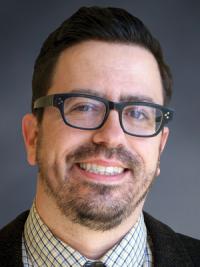Research Spotlight: Ben McCorkle

Each month, the Communications Team reaches out to members of the Department of English faculty and asks them to elaborate on a current research or creative project they are working on or have recently completed. For this month, we asked Professor Ben McCorkle about his project, 100 Years of New Media.

In your own words, as the expert that you are, can you explain the overview of your project?
First of all, it’s called 100 Years of New Media. My collaborator and I are looking at a collection of over 750 individual articles from a publication called English Journal. This is a journal that focuses primarily on K-12 English teachers, and articles tend to emphasize classroom practice—teachers sharing effective assignments, activities and so on. Specifically, we identified articles from the years 1912-2012 (it’s been around a while) that mention using some sort of technology in the classroom: radio, filmstrip projectors, magic lanterns, television, Super-8 cameras and even the computer. We coded those articles for various categories such as the teacher’s attitude toward the technology, whether students were making things with the technology or analyzing it, pedagogical goals and outcomes and generated data visualization showing how these categories change over time. In addition to creating a bunch of interactive graphs, charts and timelines, we also want to showcase the “joy” of this archive, teachers being excited about coming up with innovative uses for new technologies. To that end, we’re also making a bunch of media artifacts that highlight these moments—for example, a podcast that showcases innovative audio pedagogies over the years, or a public-access-style television segment that explores the hopes and fears teachers had dealing with the emerging menace of television.
Now, could you shorten this description into one sentence that uses accessible language?
We look back at 100 years’ worth of English Journal articles explaining how English teachers used technology in the classroom in order to tell a broad history of how those technologies were used, how their use increased or decreased over time and how students and teachers actually interacted with them.
In what ways is your research significant?
We feel that it tells a necessary history that is currently being overlooked. In the field of computers and writing, there’s a commonplace that the personal computer was a transformative, revolutionary force in the English classroom—it not only helped make writing conventional essays more efficient, it also opened the door to consider creating new types of multimodal texts that combined images, sounds, text, interactivity, etc. While we feel the computer is important, we also want to remind everyone that English teachers have been innovating with new technologies for quite a while, even having their students produce unconventional “texts” like radio dramas, documentary films, television news programs and more. The fact that so much of that innovation was going on in K-12 means that it gets passed over by those whose focus is on college-level English instruction, so we wanted to shine a light on that area to broaden our historical understanding of how English studies and technology have been interrelated.
Are you working with any colleagues or collaborators?
I am working with a collaborator on this project: Jason Palmeri, who is an Associate Professor of English at Miami University in Oxford, Ohio (who, incidentally, is an alum of our graduate program).
Where do you see this project going in the future?
The two of us have talked about perhaps bringing in additional corpuses for comparative purposes: for example, looking at journals such as College Composition and Communication or College English (which grew out of English Journal) from that same period. Since those publications deal exclusively with college-level instruction, it might be fruitful to see what key differences and similarities there are with respect to how teachers incorporated technology in their classroom practice.
What's next for you?
I’d like to devote more time to working on improving the Digital Archive of Literacy Narratives (DALN). I am currently co-director of the project, along with Michael Harker, an Associate Professor of English at Georgia State University. The DALN is a ten-plus-year public online collection of around 7500 individual stories about people’s experiences learning to read, write, code, perform and compose music, and a variety of other topics. We’ve recently updated the site to make it more user-friendly, and are planning to add even more functionality in the near future.
